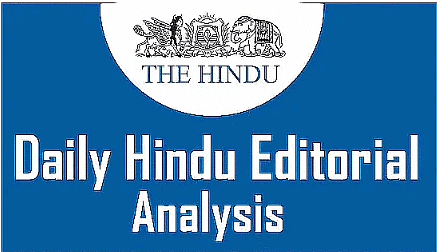UPSC Exam > UPSC Notes > Current Affairs & Hindu Analysis: Daily, Weekly & Monthly > The Hindu Editorial Analysis- 22nd May 2024
The Hindu Editorial Analysis- 22nd May 2024 | Current Affairs & Hindu Analysis: Daily, Weekly & Monthly - UPSC PDF Download

End the punishment
Why in News?
Julian Assange, founder of whistle-blower website WikiLeaks, has won a legal reprieve in the U.K., with permission to appeal against an extradition order that would see him transferred to the U.S. to face trial for allegedly leaking military secrets.
Background
Definition:- Whistleblowing: The act of disclosing information by an employee or any concerned stakeholder about illegal or unethical conduct within an organization.
- Whistleblower: A person who informs about a person or organization engaged in illicit activity.
Law Commission of India (2001):
- Recommended a law to protect whistleblowers to eliminate corruption.
- Drafted a bill addressing whistleblower protection.
Supreme Court Directive (2004):
- In response to a petition after the murder of NHAI Official Satyendra Dubey.
- Directed the Central Government to establish an administrative mechanism for handling whistleblower complaints until a law is enacted.
Public Interest Disclosure and Protection of Informers Resolution (PIDPIR) 2004:
- Notified by the government in response to the Supreme Court directive.
- Empowered the Central Vigilance Commission (CVC) to act on complaints from whistleblowers.
Second Administrative Reforms Commission Report (2007):
- Recommended the enactment of a specific law to protect whistleblowers.
UN Convention Against Corruption (2005):
- India is a signatory (although not ratified).
- Encourages states to facilitate reporting of corruption by public officials.
- Provides protection for witnesses and experts against retaliation.
- Offers safeguards against victimization of the person making the complaint.
Whistleblowers Protection Bill (2011):
- Proposed to align with international standards and conventions.
- Became the Whistleblowers Protection Act in 2014.
Companies Act, 2013 and SEBI Regulations:
- Mandate companies to take notice of all complaints regarding illegal or unethical practices.
- Ensure mechanisms are in place for the protection and proper handling of whistleblower complaints.
Key Highlights of Whistleblower Protection Act, 2014
Mechanism and Scope:- Complaints Handling: The act establishes a mechanism for receiving complaints related to allegations of corruption or willful misuse of power or discretion against public servants.
- Inquiries: Provides for inquiries into such disclosures.
- Safeguards: Includes safeguards against the victimization of whistleblowers.
- Eligibility: Allows any person, including public servants, to make public interest disclosures.
- Competent Authorities: Clearly defines various competent authorities. For instance, complaints against union ministers are to be made to the Prime Minister.
- Identity Requirement: Anonymous complaints are not allowed. No action will be taken if the complainant does not establish their identity.
- Time Limit: Complaints must be made within seven years of the incident.
- Exemptions: The act does not apply to Special Protection Group (SPG) personnel and officers under the Special Protection Group Act, 1988.
- Court of Appeal: Any person aggrieved by an order of the Competent Authority can appeal to the concerned High Court within sixty days of the order.
- Revealing Identity: Any person who negligently or maliciously reveals the identity of a complainant faces imprisonment up to 3 years and a fine up to Rs 50,000.
- False Disclosures: Persons making mala fide or knowingly false disclosures are punishable with imprisonment up to 2 years and a fine up to Rs 30,000.
- Report Preparation: The Competent Authority prepares a consolidated annual report on its activities.
- Submission: This report is submitted to the Central or State Government and laid before each House of Parliament or State Legislature.
- Official Secrets Act, 1923: The Whistleblowers Act overrides the Official Secrets Act, 1923, allowing disclosures even if they violate the latter, provided they do not harm national sovereignty.
- Restriction on Classified Documents: The amendment bill proposes that whistleblowers should not reveal documents classified under the Official Secrets Act of 1923, even for disclosing acts of corruption, misuse of power, or criminal activities. This proposal potentially dilutes the protections provided by the 2014 A
Way Forward
- Suitable legislation must be enacted to provide protection to innocent whistleblowers and the dilution of the act that is proposed by the 2015 Amendment Bill must be abandoned.
- Strengthening of the whistleblower protection mechanism will help in ensuring that the integrity of democracy is protected, cherished and upheld.
The document The Hindu Editorial Analysis- 22nd May 2024 | Current Affairs & Hindu Analysis: Daily, Weekly & Monthly - UPSC is a part of the UPSC Course Current Affairs & Hindu Analysis: Daily, Weekly & Monthly.
All you need of UPSC at this link: UPSC
|
38 videos|5258 docs|1111 tests
|
Related Searches




















